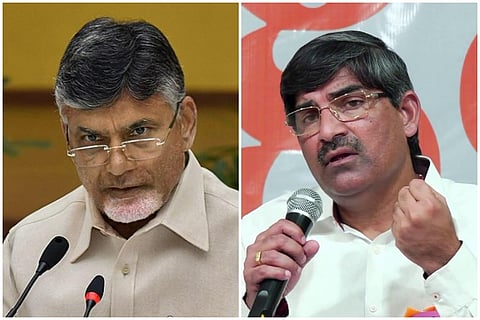

A “code war” looms over Andhra Pradesh after the general elections, triggering a debate on the use and misuse of the Model Code of Conduct (MCC) and its political ramifications.
The administration has gone for a toss in the state in a tussle between the Chief Election Commission (CEC) of India and the political executives headed by Chief Minister N Chandrababu Naidu on the question of implementing the MCC.
The CM conducted a couple of reviews over the progress of the Polavaram irrigation dam that is under construction on the Godavari river and the capital building in Amaravati, with officials from different departments on April 18, a week after the elections in the state. The Chief Electoral Officer (CEO) Gopal Krishna Dwivedi reportedly got the Chief Secretary LV Subramanyam to communicate to the rank and file of the administration the position of the MCC that envisages the CEC’s control over the administration during the operational period of the code.
When Naidu attempted to take up a review on law and order later, it failed to take off as the officials from the police and home department stayed away in line with the CEO’s SOS.
CM-CS tussle
The Model Code of Conduct came into operation right from the day and time the election schedule was announced by the CEC. In the case of a general election to the House of the People or the State Legislative Assembly, the code remains in operation till the completion of the election process as per the election notification (clauses 2 and 3 of Chapter 3 of the MCC).
As the model code lacks statutory powers, a section of ministers in Naidu’s cabinet, such as Agriculture Minister Somireddy Chandramohan Reddy, expressed their intention to defy the code and even move the Supreme Court questioning its relevance from a public interest point of view.
In the process, LV Subramanyam, a 1983 batch IAS officer, has been accused of stepping into the realm of political executives by questioning the decisions taken by the cabinet on financial matters such as diversion of funds for Naidu’s populist Pasupu Kumkuma scheme.
Relations between the Chief Secretary and Naidu turned bitter after the latter took umbrage over the EC replacing Anil Chandra Punetha with LV a few days before the polling, claiming that the senior IAS officer is a “co-accused” in the economic offence cases being faced by opposition leader YS Jagan Mohan Reddy. Naidu’s caustic remarks prompted several retired IAS officers to petition Governor ESL Narasimhan in defence of LV Subramanyam. Showing signs of a division in the official machinery on political lines, the opposition YSRCP backed the new CS, defending his actions.
What does Chapter 19 (6) (MCC) hold for CM?
Andhra Pradesh, which went to the polls for both the 175-member state Assembly and 25 Parliament seats on April 11, will be under the influence of the model code till the announcement of the election results due on May 23.
The MCC manual restrains the Chief Minister from holding video conferences or reviews with officials during the operational period of the code except on the after-effects of natural calamities of significant scale/magnitude.
CM Naidu, who differed with the National Democratic Alliance (NDA) government at the Centre over central assistance for his truncated home state in March 2018, asserted that he had every right to deliver the administrative needs of the people as a public servant as per the mandate that allows him to be in office till June 7. He accused the EC of playing into the hands of Prime Minister Narendra Modi, who is allegedly out to unleash a political vendetta against his opponents.
Additionally, the EC has been accused by the ruling Telugu Desam Party (TDP) of lacking fairness in implementing Chapter 19 (6) of the model code in the neighbouring Telangana, which is under the rule of the Telangana Rashtra Samithi (TRS).
Telangana Chief Minister K Chandrasekhar Rao held official review meetings on matters relating to irrigation and agriculture on April 17. A similar review meeting was conducted by the Agriculture minister on the after-effects of the hailstorm that hit parts of Telangana a few days ago. This contrasting experience of Telangana obviously raised doubts over the EC’s integrity and fairness.
Need for review of the MCC?
The experience in Andhra Pradesh threw open a debate on the need for taking a fresh look at the MCC with special reference to Chapter 19 (6). It became a source of conflict between the CEC of India enjoying autonomy under the Constitution and the political executive with a people’s mandate to deliver.
The particular chapter with sub-clauses 1 and 2 prohibits the chief minister from holding video conferences during the operational period of the model code on anything other than “the aftermath of a calamity of significant scale/magnitude”; it shall happen only with prior permission from the EC and in the presence of one of its representatives; video conferences with only the officials of the concerned departments shall take place out of media glare.
Well, one can understand the underlying spirit of the EC to scrupulously enforce provisos under the particular chapter of the model code when a particular state is in the process of polling to ensure fair play for both the ruling and opposition parties.
Is it necessary after the election process is completed in a state like Andhra Pradesh, which is headed by a regional party? This is a mute question that stares at the EC.